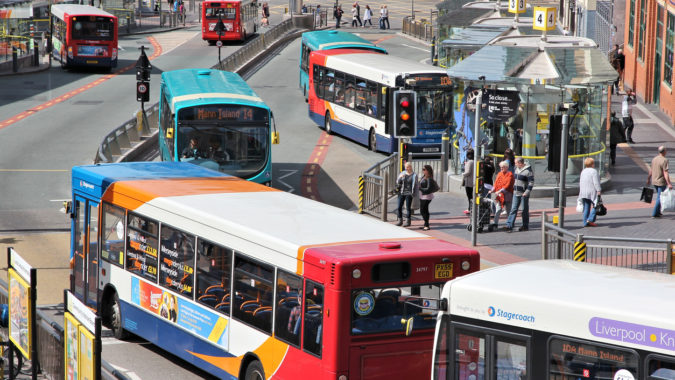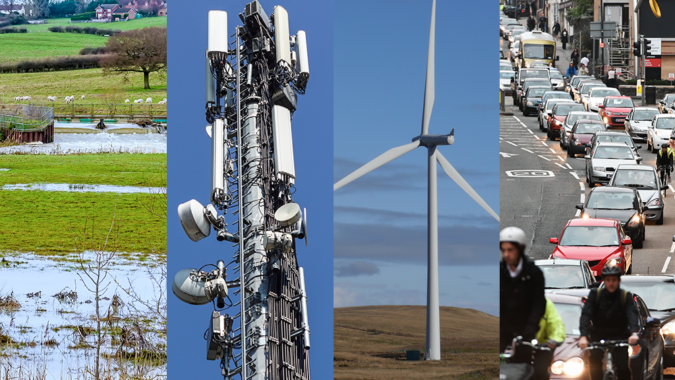James Heath, Chief Executive of the National Infrastructure Commission, spoke at the London Infrastructure Summit today (10 November 2022) organised by BusinessLDN.
In his remarks, James reflects on the challenges facing infrastructure sectors as they decarbonise, in particular the need for significant capital investment against a backdrop of economic constraints. James sets out the conditions necessary for securing inward investment in the UK to help achieve this transition, in addressing the question “Is the cost-of-living crisis an infrastructure crisis?”.
“The short answer to the question posed in the title of this session is: ‘it could be’ – if we don’t do the right things.
There is clearly a risk that current circumstances could push necessary infrastructure investment to the right.
The majority of investment in economic infrastructure sectors like energy, water and telecoms comes from the private sector and is paid for by bills.
Infrastructure faces particular scrutiny because, for many, rising energy bills are the most distressing aspect of current economic volatility – not least because they are non-discretionary.
At the Commission, we are clear that the long-term costs of delaying investment are often born by the public – and in some cases it can be those already at disadvantage who end up facing the greatest exposure to the gaps that arise in future services.
So how policy-makers and infrastructure operators can square the circle of scaling up necessary investment with constraints on the public’s ability to pay for it, is a big challenge.
This is something we are considering as part of the second National Infrastructure Assessment – our major five-yearly review of future economic infrastructure priorities – which we’ll publish in autumn next year.
In terms of dealing with the immediate challenge of rising energy prices, there is now a political consensus that government needs to stand between energy users and the wholesale energy markets.
At the Commission we are more focused on what comes next. Our consistent advice to government is that we need a rapid exit strategy from the volatility of fossil fuels. The solution to a gas price crisis is not to double down on using more gas.
The answer is to accelerate the switch to cheaper and secure low carbon energy sources – and to reduce energy waste by improving the efficiency of our buildings.
But we know this transition to low carbon energy will require significant upfront investment. There is no way of getting away from the fact that infrastructure investment overall will need to go up if we want to:
- Move away carbon intensive assets and processes in next 20-30 years
- Plus adapt to climate change pressures
- Plus catch up with a legacy of under-investment, and of unequal distribution of capital between places.
And a lot of this investment may need to be made proactively so that infrastructure networks are able to cope with increased demand, rather than wait until demand outstrips capacity.
To expand on this:
First, making infrastructure resilient to the effects of climate change will cost money – and the critical questions are: how much resilience do we want as a society and how much are we willing to pay for it?
Second example is drought. Last summer exposed the risk of extreme droughts happening in the UK – to mitigate this risk, we’ll need to reduce water leaks and reduce water consumption, at the same time as investing in new reservoirs and new water transfer infrastructure.
And, finally, net zero – the transition to net zero will be capital intensive – it involves substituting new capital assets like wind turbines and reinforced electricity grids for the opex costs of fossil fuels. While significant savings should flow to households from these investments – given the lower operating costs of low carbon technologies like electric vehicles – they will materialise over a longer period of time.
So the costs of these investments will come at some cost to household consumption. But whose consumption is affected, and when, will depend on the different funding routes that are selected, whether that’s households self-funding, paying via bills, or paying via general taxation. The right funding balance for infrastructure is something we’ll make recommendations on in the second Assessment.
All this means that whatever infrastructure sector you are talking about, proposals for new investment will be subject to rigorous economic appraisal, will need to demonstrate value for money, and will require a compelling case that the public can understand.
We’ve all heard the phrase that ‘capital is a hammer looking for investable nails’. The challenge is to attract at-scale investment to the UK while keeping the cost of the capital down. To do this, at least three conditions must be in place:
- The first condition is having clear long-term policy goals from government around which the market can orientate itself.
- Second condition is having predictable, stable regulatory models in place. But also having regulation that allows long-term rates of returns that are proportionate to the risks being taken. Economic regulators should push hard on the efficiency of investments in order to limit price increases and maintain public confidence in the system.
- The third condition – we need a pipeline of investment opportunities that build-up supply chains and so reduce cost and delivery risks as far as we can.
As a representative of the government’s official advisers on infrastructure strategy, I’ll perhaps unsurprisingly end with an appeal for collaboration between industry, regulators and government to ensure that the understandable concerns about short term affordability do not store up problems for the future that will cost more to fix later on.
If we can make the UK attractive for long-term investment and keep the costs of capital down, if we make sure infrastructure investments are done as efficiently as possible, and if we can ensure that the costs to consumers are fairly distributed – all big ‘ifs’, admittedly – then we stand a chance of preventing the cost of living crisis becoming an infrastructure crisis and will be able to make the sort of long-term, strategic investments that we need in London and indeed across the country.”



